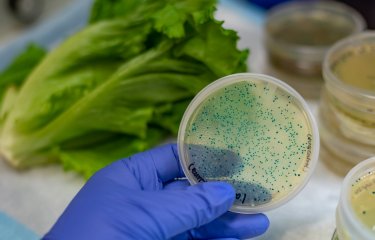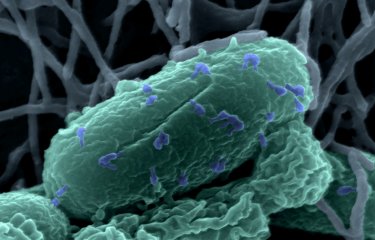Salmonellosis caused by the Salmonella bacterium is the most common example of foodborne infections, which remain a global public health problem, with over 600 million infections and 400,000 deaths every year. Use of antibiotics during outbreaks entails a risk of resistance. Scientists at the Institut Pasteur have demonstrated that bacteriophages may be used as a prophylactic treatment.
The National Reference Center for Escherichia coli, Shigella and Salmonella (CNR, in french) at the Institut Pasteur isolates approximately 10,000 cases of Salmonella in France every year. The elderly, children and immunocompromised patients are most at risk of developing severe forms of gastroenteritis, potentially resulting in death. Antibiotics are still commonly prescribed to these patients.
Use of antibiotics during outbreaks may lead to resistance
Salmonellosis outbreaks caused by the spread of contaminated food (eggs, milk, meat) can quickly lead to high infection rates (224,000 cases in the United States in 1994 and 25,000 cases in France in 1985). In such situations, mass prescription of antibiotics is one potential option, although this entails a risk of selecting antibiotic-resistant strains.
Bacteriophages: a potential treatment for preventing infection
No prophylactic treatment (administered to prevent infection) capable of actively tackling the spread of Salmonella currently exists. Traditional guidelines tend to focus on hygiene and cooking food properly. Bacteriophages (viruses infecting bacteria) can alleviate salmonellosis symptoms when administered before the onset of infection. This process has recently been demonstrated in experiments conducted by the Bacteriophage, Bacterium, Host Laboratory led by Laurent Debarbieux at the Institut Pasteur. Moreover, due to their high specificity, bacteriophages only target certain bacteria. Consequently, they do not adversely affect the intestinal microbiota, a finding revealed by the study.
A study paving the way for new bacteriophage applications
This research provides the basis for developing a prophylactic treatment free of major side effects. However, this is not the limit of the scope offered by bacteriophages: "Our work has also revealed that bacteriophages, which are increasingly viewed as a last-resort treatment for patients infected with multiple antibiotic-resistant bacteria, can also be useful for preventing large-scale infections", comments Laurent Debarbieux.
Another potential use could be to administer bacteriophages to staff working in contact with animals potentially carrying Salmonella or individuals traveling in regions where salmonellosis incidence remains high. Controlled field studies will be necessary for developing such future applications.
This study is part of the priority scientific area Antimicrobial Resistance of the Institut Pasteur's strategic plan for 2019-2023.
Prophylactic Administration of a Bacteriophage Cocktail Is Safe and Effective in Reducing Salmonella enterica Serovar Typhimurium Burden in Vivo, Microbiology Spectrum, August 25, 2021
Quentin Lamy-Besniera,b , Lorenzo Chaffringeona,c, Marta Lourençoa,d, Rayford B. Paynee, Jimmy T. Trinhe,Jennifer A. Schwartze, Alexander Sulakvelidzee, Laurent Debarbieuxa
aDepartment of Microbiology, Institut Pasteur, Paris, France
bUniversité de Paris, Paris, France
cSorbonne Université, INSERM, Centre de Recherche St Antoine, UMRS_938, Paris, France
dSorbonne Université, Collège Doctoral, Paris, France
eIntralytix, Inc., Columbia, Maryland, USA.





